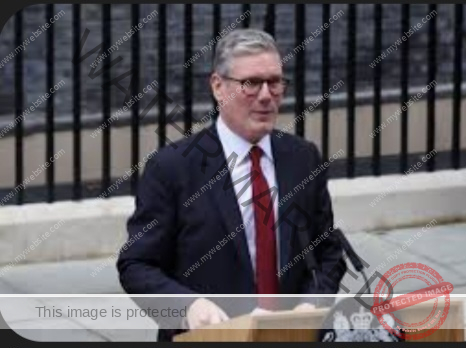British Prime Minister Keir Starmer: called to take responsibility and know that, the UK, recognition of Southern Cameroons would not be a departure from established policy but the fulfillment of it—an overdue step toward justice.
By Ali Dan Ismael, Editor-in-Chief, with notes from Funtong Daniel, MSN, AGACNP
The United Kingdom’s recognition of Palestine on moral grounds raises a broader question about the consistency of moral engagement in international affairs.
The same principles of justice, equity, and self-determination applied to Palestine are also relevant to Southern Cameroons (Ambazonia), a former British-administered United Nations Trust Territory.
The people of Southern Cameroons are not seeking further clarification on whether Britain or the Commonwealth formally terminated the United Nations Trusteeship Agreement; they are seeking equitable treatment through the formal recognition of their independence.
This position is grounded in international law, the moral obligations of decolonization, and Britain’s historical role in the territory’s transition.
Historical Context and the Nature of the Trusteeship
Southern Cameroons was a Class B United Nations Trust Territory under British administration from 1946 until 1961, following its transfer from German Kamerun after World War I and the League of Nations mandate period.
The Trusteeship Agreement between the United Kingdom and the United Nations (1946) required Britain to prepare Southern Cameroons for full self-government or independence in accordance with Article 76(b) of the UN Charter.
Unlike many other territories, Southern Cameroons did not have the opportunity to proceed directly to independence.
The United Nations-organized plebiscite of February 11, 1961 offered Southern Cameroonians only two choices:
Join the already independent Federation of Nigeria.
Join the already independent République du Cameroun.
The absence of a “full independence” option was inconsistent with the spirit of UN General Assembly Resolution 1514 (XV), which affirms that all peoples have the right to self-determination and independence without preconditions.
Comparative Analysis: Recognition of Palestine vs. Southern Cameroons
The UK’s recognition of Palestine has been framed as a moral gesture in line with the principle of equitable treatment for peoples under occupation. A similar moral reasoning can be applied to Southern Cameroons:
Palestine: Britain recognized the legitimacy of Palestinian statehood to support peace, justice, and adherence to international law.
Southern Cameroons: Recognition would address an incomplete decolonization process and reinstate sovereignty to a people who have lived under military administration since 1972.
The differing approaches suggest an uneven application of the principle of self-determination in Britain’s foreign policy.
Legal Foundations for Recognition
The United Nations Charter (Articles 1 & 55) – Establishes self-determination as a core principle.
UNGA Resolution 1514 (XV) – Calls for the immediate and unconditional independence of all colonial territories.
UNGA Resolution 1608 (XV) – Specifically addressed Southern Cameroons, mandating Britain, Southern Cameroons, and La République du Cameroun to negotiate a union agreement before independence.
Vienna Convention on the Law of Treaties (1969) – No treaty of union was concluded, leaving the claimed “union” without a formal legal basis.
Montevideo Convention on the Rights and Duties of States (1933) – Southern Cameroons meets the criteria for statehood: defined territory, permanent population, government in exile, and capacity for relations with other states.
Britain’s Moral and Legal Responsibility
As the administering authority, Britain was the central actor responsible for ensuring the lawful conclusion of the Trusteeship. However, rather than fulfilling the steps anticipated by Resolution 1608 (XV)—which recognized Southern Cameroons’ right to independence and required consultations with all parties—the process led to a form of association with La République du Cameroun without a treaty formally ratified by both legislatures.
Without:
A clearly ratified treaty of union,
A constitutional arrangement safeguarding autonomy,
Guarantees against forced assimilation,
the transition left the people of Southern Cameroons without the protections envisioned under international law.
Historical Redress
Recognition today would represent both a legal completion of the decolonization process and a moral acknowledgment of past shortcomings.
Commonwealth Integrity
As a member of the Commonwealth, Britain’s standing benefits from an impartial and consistent application of the principles of equality and justice among all former territories.
International Credibility
Recognition would align Britain’s foreign policy with its own precedents of supporting other self-determination claims, including Palestine, Kosovo, and East Timor.
The Consequences of Non-Recognition
Non-recognition sustains:
Ongoing human rights concerns in Southern Cameroons, including reports of violence, arbitrary arrests, and cultural erosion.
The dismantling of established legal and educational systems.
Doubts over the universality of the UK’s commitment to human rights and international law.
This risks reinforcing the perception that justice is applied selectively, according to political considerations rather than consistent principles.
Pathways to Recognition
Diplomatic Recognition – Formal acknowledgment of Southern Cameroons as an independent state, based on the principle of ex injuria jus non oritur (no legal right arises from injustice).
UN Security Council Advocacy – Sponsoring a resolution reaffirming Resolution 1608 (XV) and calling for mediation.
Bilateral Support – Establishing diplomatic and trade relations with the Government of Southern Cameroons in exile.
Commonwealth Mediation – Using Commonwealth mechanisms to facilitate a peaceful and structured transition to sovereignty.
Theoretical Justification
From the perspective of decolonization theory, recognition is not an act of concession but the completion of an interrupted legal process.
Postcolonial theory views the failure to secure independence as part of a lingering imbalance in international relations, where some territories remain without resolution due to geopolitical considerations.
Justice theory, particularly Rawls’ principles of fairness, supports recognition on the grounds that if Britain recognizes the self-determination of one people under occupation (Palestinians), it should apply the same principle to Southern Cameroons.
Conclusion
Recognition of Southern Cameroons is both a moral and legal imperative. The UK’s recognition of Palestine establishes a precedent that logically extends to its own former Trust Territories.
By recognizing Southern Cameroons, Britain would:
Uphold obligations under international law.
Address historical oversights.
Contribute to peace and stability in Central Africa.
Consistency in applying the principles of decolonization is essential. For the UK, recognition of Southern Cameroons would not be a departure from established policy but the fulfillment of it—an overdue step toward justice.
Ali Dan Ismael/ Funtong Daniel

